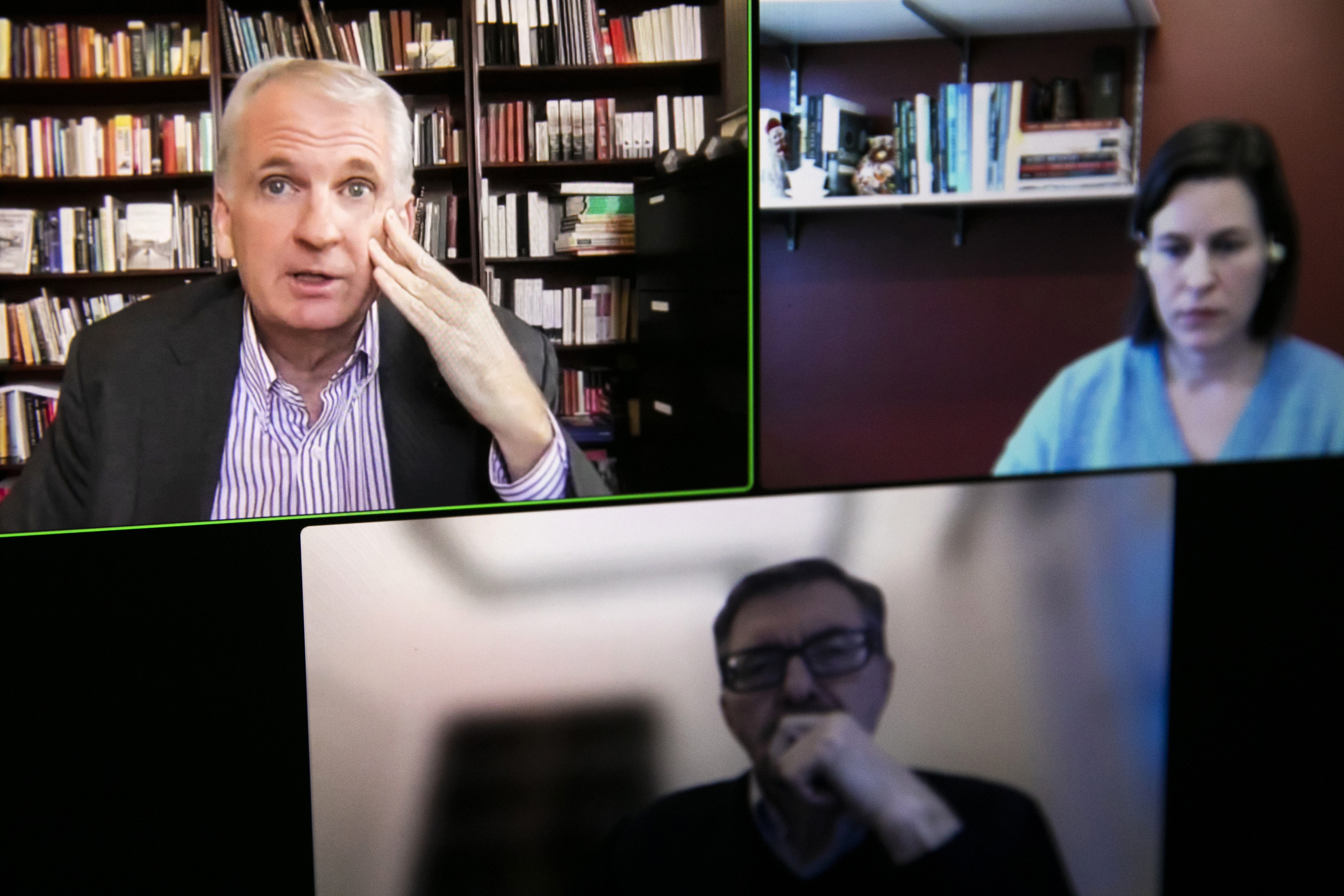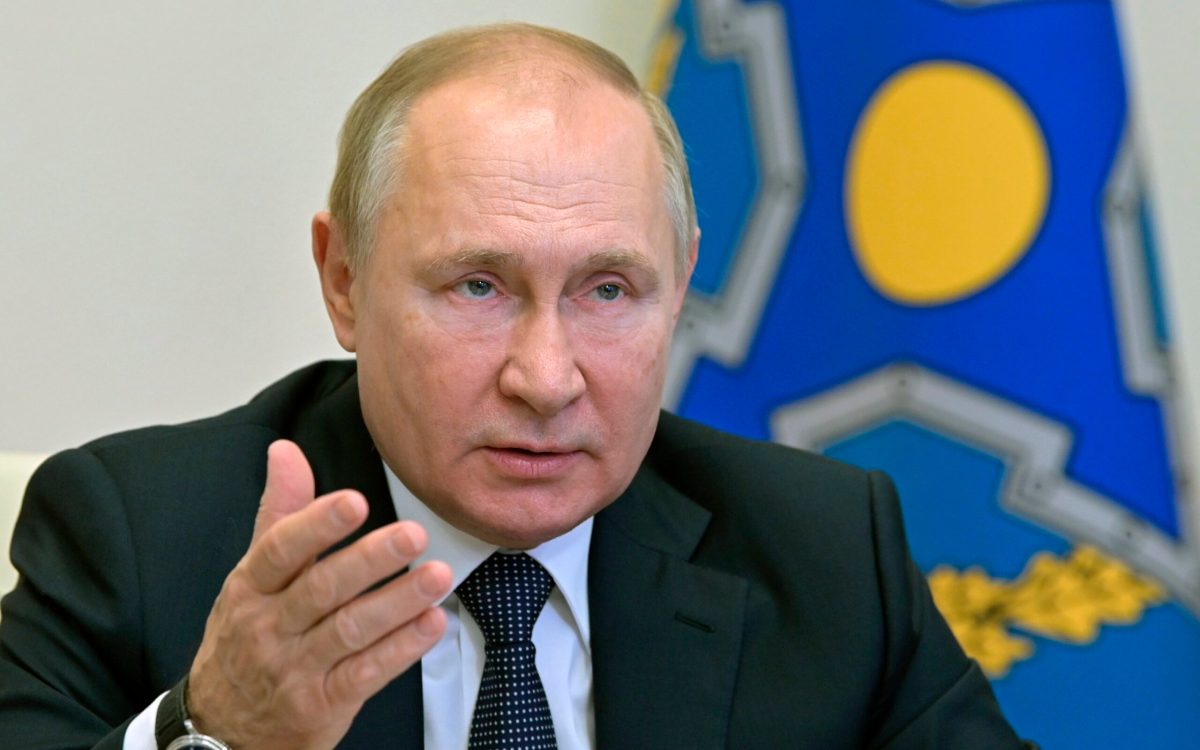
Yale historian Timothy Snyder (clockwise from top left) discussed how the past, both real and imaginary, is driving the Russian Federation’s invasion of Ukraine. Snyder gave the Petryshyn Lecture with moderator Emily Channell-Justice and Director of Ukrainian Research Institute Serhii Plokhii.
Stephanie Mitchell/Harvard Staff Photographer
Upending Putin’s Russia-Ukraine myth
Historian rebuts claims of two nations as inseparable, argues leader is trying to control narrative to justify actions
In a speech Monday, Russian President Vladimir Putin denied Ukraine’s legitimacy as a sovereign nation, along with that of the other former Soviet republics that broke away after the collapse of the Soviet Union starting in the late 1980s. The speech was widely viewed in the West as part of a prelude to a full-scale invasion of Ukraine by Russian forces now surrounding its borders.
Last summer, in an essay titled “On the Historical Unity of Russia and Ukraine,” Putin argued the people of the two countries share a common history and identity and Ukraine had been unjustly severed from Russia through the work of anti-Russian forces and must be reunified.
For Putin, the conflict between Russia and Ukraine is about correcting an event 30 years ago that he believes never should have taken place, said Timothy Snyder, professor of history and global affairs at Yale University, during the annual Petryshyn Memorial Lecture in Ukrainian Studies hosted by the Ukrainian Research Institute at Harvard University Friday.
“The conflict, and the threatened conflict, over Ukraine has to do with the past. I don’t mean that the conflict has to do with history. Rather, that [it] has to do with something like memory or myth or memorialization or the selective ways that governments and leaders choose to talk about the past and choose to instruct their people to think about the past,” said Snyder, a scholar of Eastern and Central European history and author of “On Tyranny” (2017) and “The Road to Unfreedom” (2018), which detailed Russian efforts to influence Western democracies.
Snyder walked through centuries of Ukrainian history, back to the Middle Ages, arguing that despite relentless Russian propaganda that paints Ukraine as aberrant or devoid of any unique history separate and apart from Russia, the country is decidedly conventional.
“The degree to which the past of Ukraine receives intense and usually distorting attention from other countries — that is abnormal. But the history of Ukraine itself, I think, is rather normal,” though the situation the country faces right now is anything but, he said.
“It’s not normal to have an ongoing war with a much larger, nuclear-armed neighbor. It’s not normal to have three of your provinces either completely or partially occupied by a much larger nuclear-armed neighbor,” said Snyder. “In the war that’s been ongoing since 2014, some 14,000 citizens of Ukraine have been killed. If we projected that to the scale the United States, that would be more than 100,000 people — more than the United States has lost in any war since the Second World War.”
Though Putin has been “very, very effective” at framing the issues between Russia and Ukraine in ways that serve and further his agenda, Snyder said the West can push back just as effectively by telling stories that show the richness and complexity of Ukraine today.
“What’s most important is that people understand that Ukraine has opera houses, … that Ukraine has kindergartens, that Ukraine has literature,” he said. “If you’re going to tell stories, don’t tell stories about the past. That’s Mr. Putin’s territory — to make everything into a kind of fairy tale. History is not a story. Tell stories about things that are happening now, which are interesting, which give the country a face.”
The Biden administration has done a “pretty good job” explaining to the American public why Russia’s actions threaten Ukraine’s sovereignty, he said, and broadly, there’s been a positive shift in the way policymakers view and the U.S. press covers Ukraine today since 2014. In February of that year Russian troops seized the Crimean peninsula from Ukraine after a violent uprising in Kyiv toppled pro-Russia President Viktor Yanukovych. Two months later pro-Russia separatists claimed control of the Donetsk and Luhansk regions, where fighting with Ukrainian forces has continued ever since.
On Tuesday Putin ordered “peacekeeping” troops sent to Donetsk and Luhansk one day after declaring them independent countries. The move triggered economic sanctions from the U.S. and other Western powers.
“The way that people were speaking about Maidan [Revolution] in mainstream American media was almost impossibly distanced from the experiences of my friends and people who were there,” said Snyder, who lived in Europe at the time, of the protests that led to Yanukovych’s ouster. “It was Russian tropes, contradictory Russian tropes, that drove the conversation. Compared to then, now is much, much better.”
The U.S. strategy to pre-emptively announce what Russia may do next in Ukraine, putting Putin back on his heels by seizing control of the public narrative about the unfolding conflict, has worked quite well, “at least so far,” said Snyder. Across “the U.S. government, there is much broader recognition now than there was in 2014 that propaganda and narrative are important.”
The debate over whether NATO should admit or bar Ukraine from joining, as Russia demanded during recent negotiations with Western diplomats, is largely a red herring, Snyder contends.
“For me, the most important thing is that everyone talks about Ukraine as a sovereign state which can seek to join whatever alliances it wishes to join,” he said. “I think he’s more afraid of the European Union, and, in the general idea of prosperous, rule of law, pluralist democratic states. He’s much more afraid of that than he is of NATO.”
Ultimately, why we should pay attention to Ukraine and its history is not merely as a counterweight to Russian mythology and propaganda, Snyder argued.
“My sincere view is that Ukraine is the most interesting country in Europe; it has the most interesting history in Europe,” he said. “Ukraine is a place that helps us to understand other places, that Ukraine has a lot to give in terms of understanding. It’s not just a vacuum. It’s not just a place which gets defined by Russia. It’s a place which helps us to define ourselves.”







